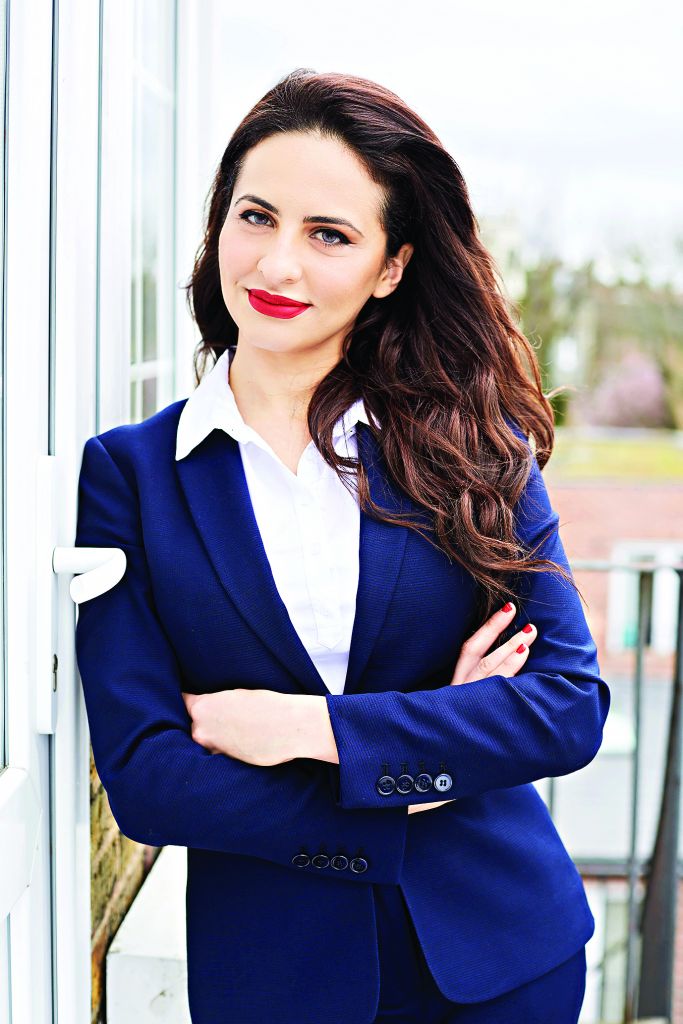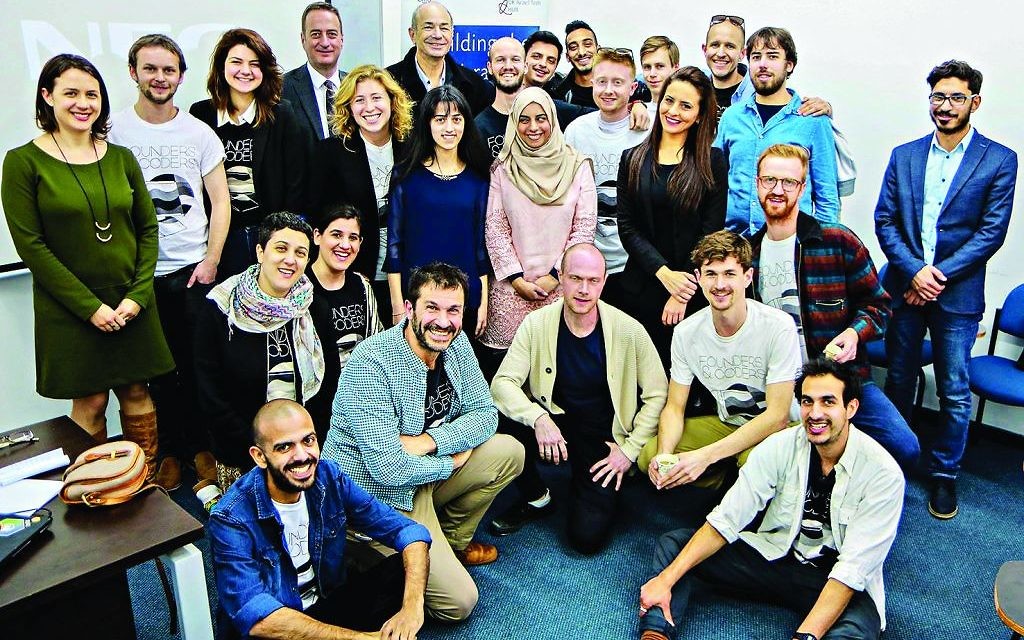Matchmaker to start-ups that need a helping hand
Stephen Oryszczuk meets the Arab-Israeli helping British companies find commercial common ground with Israeli innovators
Dona Haj is a business match-maker with a long list of shidduchs to her name. As part of the British Embassy’s UK Israel Tech Hub, she has spent the past few years making matches from Tel Aviv. But late last year, the Hub expanded. Welcome to London’s new shadchan.
Before arriving, Haj led the Hub’s work the Arab sector, helping Israeli-Arab start-ups go global with British firms. An Arab Israeli herself, she retains a keen interest, having begun her career by helping entrepreneurs and small businesses in Nazareth take off.
The Hub – started in 2011 by then-ambassador Matthew Gould – aims to give British companies a “competitive edge” by accessing Israeli technology. Hubbers work out what UK firms need, then “scout” Israeli start-ups that can help.
Get The Jewish News Daily Edition by email and never miss our top stories Free Sign Up
Sectors include banking, retail, healthcare, insurance and pharmaceuticals, and examples of matches abound: British drugs giant GSK got smoochy with Technion University; bank RBS got down and dirty with Tel Aviv innovation centre The Floor; and Oxford University Press found love in an Israeli start-up able to digitise its publications in a more engaging way. Macho British innovators, such as Dyson, just can’t get enough of their petite Israeli peers.

It’s not just firms that want in on the action, says Haj. UK Government agencies are also interested, and want the Hub’s help in fields such as cybersecurity. Why?
“A lot of factors went into creating a [cyber-security] success story like Israel,” she says. “For example, how the government intervened, how the chief scientist intervened, how the academics helped, how they scaled up companies in this sector. That’s why they come: to see how they can duplicate the model.”
She’s just back from taking a delegation of UK-based auto manufacturers to Israel, where they toured tech hubs, visited companies such as Mobileye (just sold to Intel for $15 billion) and saw the sights. Who pays for all this? It’s part-funded by private donors, she says, but won’t tell me who. She also won’t tell me what the Hub’s financial key performance indicator is either.
/Likewise, she’s cagey on her age and status, but does, eventually, tell me she’s “over 30” and a Muslim Arab, but that she’s not religious. She finally discards the corporate speak, telling me how she grew up in an Arab town near Acre, worked with Tsofen in Nazareth, helped get Arab-Israeli women into high tech, and how she is passionate about overcoming the challenges the Arab sector faces.
“If I’m an Arab entrepreneur, even though I’m in the start-up nation, I don’t have connections, I don’t have the access,” she says. Because Israeli Arabs don’t serve in the IDF, they lose out on the networking this gives.
“Besides this, most Arab towns are not near Tel Aviv, where everything’s happening. Most can’t access tech firms, or foreigners who invest in start-ups. Most don’t have uncles or cousins already in tech. That’s why there’s this disconnection. Also, Israelis travel; they spend time in Europe or America then come back and start a company. But for Israeli Arabs, their international experience is very limited.”
This makes her unusual, she says. “You don’t see many Arab girls living abroad. My background was different to that of my Jewish friends – my education, environment, values, opportunities… When you’re born an Arab Israeli, it’s an amazing culture, but there are also challenges. That’s why we’re here. We want to help them accelerate this talent.”
When the Hub brings Israeli-Arab entrepreneurs to the UK, it’s usually their first time abroad, certainly in a major Western city. Most don’t know how to navigate a modern city, and many get lost. It’s a steep learning curve.
The British companies choosing which Israeli partner (Arab or Jewish), to smooth-talk are “colour-blind,” she says. The patter’s working; more than 80 partnerships worth £600 million equate to dozens of notches on the Hub’s bedposts.
And what of Haj? She’s in love – with the Brits! “It wasn’t easy, I had a good life in Israel, but I love it here. They’re open to doing stuff. The British are dreamers and doers. For me, this is the best environment.”

Thank you for helping to make Jewish News the leading source of news and opinion for the UK Jewish community. Today we're asking for your invaluable help to continue putting our community first in everything we do.
For as little as £5 a month you can help sustain the vital work we do in celebrating and standing up for Jewish life in Britain.
Jewish News holds our community together and keeps us connected. Like a synagogue, it’s where people turn to feel part of something bigger. It also proudly shows the rest of Britain the vibrancy and rich culture of modern Jewish life.
You can make a quick and easy one-off or monthly contribution of £5, £10, £20 or any other sum you’re comfortable with.
100% of your donation will help us continue celebrating our community, in all its dynamic diversity...
Engaging
Being a community platform means so much more than producing a newspaper and website. One of our proudest roles is media partnering with our invaluable charities to amplify the outstanding work they do to help us all.
Celebrating
There’s no shortage of oys in the world but Jewish News takes every opportunity to celebrate the joys too, through projects like Night of Heroes, 40 Under 40 and other compelling countdowns that make the community kvell with pride.
Pioneering
In the first collaboration between media outlets from different faiths, Jewish News worked with British Muslim TV and Church Times to produce a list of young activists leading the way on interfaith understanding.
Campaigning
Royal Mail issued a stamp honouring Holocaust hero Sir Nicholas Winton after a Jewish News campaign attracted more than 100,000 backers. Jewish Newsalso produces special editions of the paper highlighting pressing issues including mental health and Holocaust remembrance.
Easy access
In an age when news is readily accessible, Jewish News provides high-quality content free online and offline, removing any financial barriers to connecting people.
Voice of our community to wider society
The Jewish News team regularly appears on TV, radio and on the pages of the national press to comment on stories about the Jewish community. Easy access to the paper on the streets of London also means Jewish News provides an invaluable window into the community for the country at large.
We hope you agree all this is worth preserving.
-
By Laurent Vaughan - Senior Associate (Bishop & Sewell Solicitors)
-
By Laurent Vaughan - Senior Associate (Bishop & Sewell Solicitors)
-
By Laurent Vaughan - Senior Associate (Bishop & Sewell Solicitors)
-
By Laurent Vaughan - Senior Associate (Bishop & Sewell Solicitors)






















